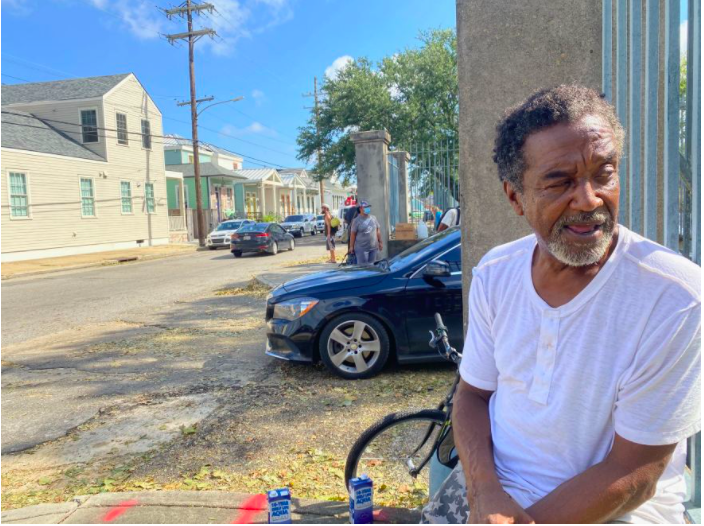WWNO (9/1/21): Frank Jackson, 60, appeared tired and weary as he sat outside the Mahalia Jackson Theater in Treme Wednesday morning where the Louisiana National Guard was distributing MREs, water and ice.
It was about 10 a.m., and Jackson was already covered in sweat, having biked more than two miles from his home at Magnolia Street and Martin Luther King Jr. Boulevard. He is helping to care for his four grandchildren so he spends his days riding around town looking for food and other supplies.
Jackson said he has to keep moving and searching in order to survive the long, hot days.
“Nothing comes to a sleeper but a dream,” he said.
Until a reporter asked how he did during Hurricane Ida, Jackson said he didn’t even know the name of the storm, having weathered so many.
“Ida,” Jackson said slowly, testing the sound of the latest tormentor of southeast Louisiana.
Despite his perseverance and hustle, Jackson admitted he was tired. He said he didn’t know post-storm life was going to be this rough. Everything in his refrigerator has gone bad. He doesn’t have any clean clothes, and he can’t access the little money he has because all the ATMs are down.
“Why don’t they have emergency back-up generators for these ATM machines? What good is having an ATM card if you can’t use it?”
The worst, though, is the night.
“With the mosquitos, pitch black dark, you can’t see nothing. It’s just really miserable. Humid, and fighting bugs,” Jackson said. “You try to stay inside, and you come back out and all you’re looking at is nothing but darkness. I never thought those street lights meant so much.”
Aside from the return of power, the greatest needs for those New Orleanians attempting to survive the devastation of Hurricane Ida are gas, food, ice, water and cash to purchase supplies. And though the city so far has been unable to assist with either gas or cash, beginning on Tuesday it set up daily food and supply distribution sites throughout the city.
A steady stream of people on foot and in cars moved through the Treme site as National Guard troops handed out supplies. Capt. Kim Alexius-Watkins, 51, said by day’s end she anticipates they will hand out 50,000 MREs, or Meals Ready to Eat.
“People have been appreciative,” Alexius-Watkins said. “There is a true need for us being out here. It just makes us feel good.”
Alexius-Watkins lives in Slidell where her house took on four feet of water during Hurricane Katrina. After that storm, she said she was inspired to join the National Guard so she could help her community in the event of another disaster. And here she is, exactly 16 years later.
“It’s like déjà vu all over again, but without the water,” Alexius-Watkins said.
As Jackson prepared to leave, he regretted he didn’t bring a wagon to cart bags of ice back home, but said he’d be back tomorrow.
His grandchildren, at first, didn’t understand the threat of the storm, he said. When the power first went out, they thought it was a fun game, running around with their flashlights. But now, when they open the refrigerator and all the food is rotten and they don’t have any cold drinks or milk for their cereal, they understand
“They’re grasping the seriousness of it,” Jackson said.
Several hours later, at a food distribution site in St. Roch Park, community members Chelsea Nelson, 34, Keenen Bellaphant, 26, and Kolby Simms, 13, helped serve scoops of chicken noodle stew and bananas to their thankful neighbors.
Nellie Catzen, 30, executive director of the Committee for a Better New Orleans, said the city reached out Tuesday looking for community leaders to help organize food sites throughout the city. She volunteered the assistance of her group and set up two serving stations in the park. The food is donated and prepared by the international global relief organization World Central Kitchen, which is temporarily stationed at the New Orleans Culinary & Hospitality Institute.
Catzen said they served 1,000 meals Tuesday and expected to serve the same amount Wednesday. There are likely more people in need, but spreading the word has proven difficult in a city where most people no longer have access to the internet, radio or television. As the crisis drags on, the number of residents who require additional services will grow, and that has Catzen concerned.
“I know everybody at the city is working as hard as they can to get through what’s a really tough situation,” Catzen said. “But it’s this part now — the heat and the resources running low — that’s going to be where a real push (for assistance) is needed the most.”
Read the original story on WWNO here.

